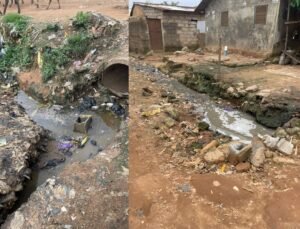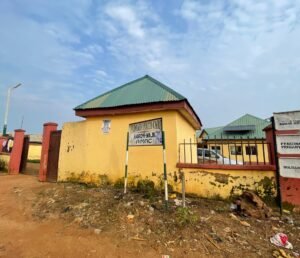ABUJA, Nigeria – In the heart of Nigeria’s capital city, Abuja, gleaming highways and rising estates often mask a darker reality—just a few kilometres away, communities are sinking under the weight of neglect. Karonmajiji, a settlement just 14.6 kilometres approximately 18 minutes away from the country’s seat of power located along the bustling Airport Road, is one such place where poor drainage has turned into a silent killer.
Here, blocked gutters, stagnant pools, and foul-smelling refuse create breeding grounds for mosquitoes and bacteria, leaving families caught in cycles of malaria, typhoid, poverty, and despair.
For many children, each rainfall spells danger. For parents, every hospital visit means another blow to their meagre earnings. In this report, Chukwu Obinna, through interviews with residents, health workers, and experts, reveals how poor drainage in Abuja’s peri-urban communities is not just an infrastructural flaw but also a humanitarian crisis.

A Community Drowning in Neglect
Karonmajiji is home to thousands, yet it remains excluded from Abuja’s grand city blueprint. During the rainy season, residents say their narrow streets transform into small rivers. Floodwater surges into homes, carrying waste and disease.
Urban planners warn that settlements like Karonmajiji are among the fastest-growing peri-urban communities around Abuja, but they receive little to no infrastructural investment.
The result? A community that survives from one rainy season to the next, with each downpour bringing a new wave of illnesses.
“The water comes into our house and mosquitoes take over. Just last month, my youngest child had malaria twice. We spend more on hospital bills than on food,” Mrs. Aisha Musa, resident and mother of three.
When Floods Breed Sickness
Each time the skies open, Karonmajiji virtually drowns. Water from blocked drains gushes into compounds, mixing with household waste and faecal matter. These stagnant pools then become incubators for malaria-carrying mosquitoes, diarrhoea-spreading flies, and bacteria that contaminate water supplies.
According to the World Health Organization (WHO), Nigeria accounts for 27% of the world’s malaria burden—a figure worsened by conditions like those in Karonmajiji.
“The dirty water flows near our cooking area. It smells terribly and attracts insects. My daughter was admitted for typhoid recently. The nurse told me it was because the water we drink gets contaminated,” Mrs. Blessing Okonkwo, resident.
For mothers like Blessing and Aisha, poor drainage is not a minor inconvenience—it is a matter of survival.
Clinic Records Tell the Story
At the Karonmajiji community clinic, health workers say they witness the tragedy every week. After each rainfall, patient numbers rise dramatically.
“After every heavy rainfall, our cases of malaria, diarrhoea, and typhoid shoot up. Children suffer the most. Many families rely on shallow wells that are easily polluted once the drains overflow,” Nurse Ibrahim Sule, community health worker.
Data shared with Africa Health Report (AHR) shows that between May and August alone, over 60% of outpatient visits were linked to malaria, typhoid, or diarrhoea. With drugs in short supply and limited staff, the clinic is overwhelmed.

The Poverty–Disease Trap
The financial impact of recurring illness is devastating. Families already living on small incomes are forced to spend heavily on hospital bills. Some borrow money, others sell belongings, and many cut down on food to pay for treatment.
Development experts call this an “environmental poverty trap”—a vicious cycle where lack of infrastructure fuels poverty, and poverty in turn prevents families from escaping poor living conditions.
“Each rainfall is like a curse. We lose money, children miss school, and the sickness does not stop. It feels like we are forgotten,” Mr. Emmanuel John, Karonmajiji resident and petty trader.
Missing Leadership, Weak Advocacy
When asked about what steps are being taken, many residents say their appeals have fallen on deaf ears. Attempts to reach the community’s traditional leader for comment proved unsuccessful.
Residents believe that without strong leadership to push for government intervention, Karonmajiji will continue to be neglected despite its proximity to the seat of power.
Environmental activists argue that Abuja’s landscape reflects two faces of the city—the polished city centre with its modern estates and the forgotten outskirts where poor communities like Karonmajiji are left to rot.
“Neglecting drainage is not just an environmental issue. It is a matter of life and death. The government cannot continue to showcase Abuja while allowing its fringe communities to sink,” environmental health advocate, Dr. Hadiza Mohammed said in an interview with AHR.
Possible Pathways to Solutions
According to Mohammed, the situation in Karonmajiji mirrors conditions in many satellite towns and growing slums within the FCT, where lack of decent housing has pushed residents into open defecation.
“Sanitation and water problems do not respect boundaries or households,” he said. “Karonmajiji’s poor sanitation, like that of Mpape, has serious implications for Abuja’s city centre. Residents live in squalor just minutes away from the National Assembly and other high-brow districts.”
He warned that the proximity of slum dwellers to institutions and businesses heightens risks.
“When residents contract diseases, they can easily pass them on to government officials and private sector workers who live nearby. It is in everyone’s interest to address these conditions,” he stressed.
He further noted that over 30 percent of residents lack modern toilets. “With no proper waste disposal system, many resort to the bush. When waste spills, it flows directly into the drains, worsening public health risks,” he added.
He said the FCT administration should go back to implement its original master plan, which specified certain things to be built in the satellite towns.
“Community actions could include organised sanitation drives, stop indiscriminate dumping of refuse, and maintain existing drains if there is any.”
Multimedia Caption: “Community sanitation drive in progress – residents say such efforts are not enough without government support.”
A Call to Action
The story of Karonmajiji is not unique. Across Nigeria, poor drainage remains a ticking time bomb in many urban and semi-urban communities. What makes it alarming here is the location—barely minutes away from the nation’s capital, where resources and decision-makers reside.
If urgent measures are not taken, experts warn that the health and economic costs will multiply, deepening poverty and undermining national development goals.
For the mothers watching their children fall sick repeatedly, for the nurses stretched thin at the clinic, and for the families drowning in medical bills, the question remains: How long must Karonmajiji wait for clean, safe living conditions?
Until leaders listen, the dirty drains will keep breeding sick children, and dreams will continue to die silently in this forgotten corner of Abuja.




Istanbul Archaeological Museum tour Amazing tour! Our guide was very knowledgeable. https://fanoosalinarah.com/?p=177647